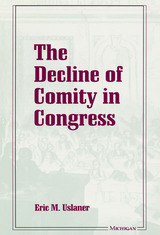2 books by Uslaner, Eric M.

The Decline of Comity in Congress
Eric M. Uslaner
University of Michigan Press, 1996
Why do members of Congress resort to name-calling? In this provocative book, Eric M. Uslaner proposes that Congress is mirroring the increased incivility of American society. He points to five core values—American exceptionalism, enlightened individualism, egalitarianism, science as social engineering, and religion—that have been eroded since the 1960s. The author argues that a lack of trust permeates members of Congress to the point that they would rather seek control than compromise. This, Uslaner contends, is the real cause of gridlock in Washington. The Decline in Comity in Congress demonstrates why institutional reform will not correct this problem and why Americans need to change before their government can.
[more]

Institutions and Social Order
Karol Soltan, Virginia Haufler, and Eric M. Uslaner, Editors
University of Michigan Press, 1998
"Institutionalism" is the buzzword of the 1980s and 1990s in the social sciences. What is new in the contemporary analysis of institutions and what does it offer to the study of social order? In this book a distinguished group of social scientists drawn from political science, economics, and sociology, explore this question and show us how different theoretical approaches to institutional analysis can be joined to build a more thorough understanding of institutions.
The modern analysis of institutions has taken two separate paths. Rational choice theories identified institutions as a strategic response to collective action problems and as instruments for the promotion of cooperation. Contrary to these theories, such cooperation is fundamental to social order and a prerequisite for economic growth and development. An alternate form of institutionalism, drawn from sociological and historical analysis, de-emphasized the role of choice, strategy, and design in the construction of many of the major institutions in social life. This form of institutional analysis pointed to the role of prior choices, common norms, and culture in making certain options and choices unthinkable or impossible. Institutions, according to this view, may represent a certain kind of social order, but they do not always promote cooperation and economic growth. The more recent theories in the "new institutionalism" bring these seemingly irreconcilable perspectives closer together. New institutionalists argue that institutions must be grounded in the social fabric, and thus rational choice must be combined with historical and cultural variables. The papers collected in this volume address the merging of rational choice and historical-sociological institutionalism in the "new institutionalism."
The contributors are Randall L. Calvert, Christopher Clague, Kathleen Cook, Peter Hall, Virginia Haufler, James Johnson, Gary Miller, Karol Soltan, Rosemary C. R. Taylor, Eric M. Uslaner, and Barry Weingast.
Karol Soltan is Associate Professor of Political Science, University of Maryland. Eric M. Uslaner is Professor of Political Science, University of Maryland. Virginia Haufler is Assistant Professor of Political Science, University of Maryland.
The modern analysis of institutions has taken two separate paths. Rational choice theories identified institutions as a strategic response to collective action problems and as instruments for the promotion of cooperation. Contrary to these theories, such cooperation is fundamental to social order and a prerequisite for economic growth and development. An alternate form of institutionalism, drawn from sociological and historical analysis, de-emphasized the role of choice, strategy, and design in the construction of many of the major institutions in social life. This form of institutional analysis pointed to the role of prior choices, common norms, and culture in making certain options and choices unthinkable or impossible. Institutions, according to this view, may represent a certain kind of social order, but they do not always promote cooperation and economic growth. The more recent theories in the "new institutionalism" bring these seemingly irreconcilable perspectives closer together. New institutionalists argue that institutions must be grounded in the social fabric, and thus rational choice must be combined with historical and cultural variables. The papers collected in this volume address the merging of rational choice and historical-sociological institutionalism in the "new institutionalism."
The contributors are Randall L. Calvert, Christopher Clague, Kathleen Cook, Peter Hall, Virginia Haufler, James Johnson, Gary Miller, Karol Soltan, Rosemary C. R. Taylor, Eric M. Uslaner, and Barry Weingast.
Karol Soltan is Associate Professor of Political Science, University of Maryland. Eric M. Uslaner is Professor of Political Science, University of Maryland. Virginia Haufler is Assistant Professor of Political Science, University of Maryland.
[more]
READERS
Browse our collection.
PUBLISHERS
See BiblioVault's publisher services.
STUDENT SERVICES
Files for college accessibility offices.
UChicago Accessibility Resources
home | accessibility | search | about | contact us
BiblioVault ® 2001 - 2024
The University of Chicago Press









